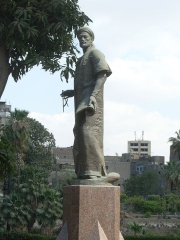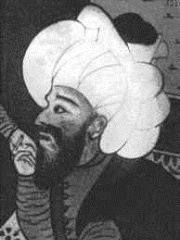

The Most Famous
ASTRONOMERS from Uzbekistan
This page contains a list of the greatest Uzbekistani Astronomers. The pantheon dataset contains 644 Astronomers, 2 of which were born in Uzbekistan. This makes Uzbekistan the birth place of the 34th most number of Astronomers behind Syria, and Estonia.
Top 2
The following people are considered by Pantheon to be the most legendary Uzbekistani Astronomers of all time. This list of famous Uzbekistani Astronomers is sorted by HPI (Historical Popularity Index), a metric that aggregates information on a biography's online popularity.

1. Ahmad ibn Muhammad ibn Kathir al-Farghani (810 - 860)
With an HPI of 66.82, Ahmad ibn Muhammad ibn Kathir al-Farghani is the most famous Uzbekistani Astronomer. His biography has been translated into 33 different languages on wikipedia.
Abū al-ʿAbbās Aḥmad ibn Muḥammad ibn Kathīr al-Farghānī (Arabic: أبو العبّاس أحمد بن محمد بن كثير الفرغاني) also known as Alfraganus in the West (c. 800 – 870), was an astronomer in the Abbasid court in Baghdad, and one of the most famous astronomers in the 9th century. Al-Farghani composed several works on astronomy and astronomical equipment that were widely distributed in Arabic and Latin and were influential to many scientists. His best known work, Kitāb fī Jawāmiʿ ʿIlm al-Nujūmi (whose name translates to Elements of astronomy on the celestial motions), was an extensive summary of Ptolemy's Almagest containing revised and more accurate experimental data. Christopher Columbus used Al Farghani's calculations for his voyages to America (but mistakenly interpreted Arabic miles as Roman miles). In addition to making substantial contributions to astronomy, al-Farghani also worked as an engineer, supervising construction projects on rivers in Cairo, Egypt. The lunar crater Alfraganus is named after him.

2. Ali Qushji (1403 - 1474)
With an HPI of 63.65, Ali Qushji is the 2nd most famous Uzbekistani Astronomer. His biography has been translated into 28 different languages.
Ala al-Dīn Ali ibn Muhammed (1403 – 18 December 1474), Persian: علاءالدین علی بن محمد سمرقندی known as Ali Qushji (Ottoman Turkish : علی قوشچی, kuşçu – falconer in Turkish; Latin: Ali Kushgii) was a Timurid theologian, jurist, astronomer, mathematician and physicist, who settled in the Ottoman Empire some time before 1472. As a disciple of Ulugh Beg, he is best known for the development of astronomical physics independent from natural philosophy, and for providing empirical evidence for the Earth's rotation in his treatise, Concerning the Supposed Dependence of Astronomy upon Philosophy. In addition to his contributions to Ulugh Beg's famous work Zij-i-Sultani and to the founding of Sahn-ı Seman Medrese, one of the first centers for the study of various traditional Islamic sciences in the Ottoman Empire, Ali Kuşçu was also the author of several scientific works and textbooks on astronomy.
People
Pantheon has 2 people classified as Uzbekistani astronomers born between 810 and 1403. Of these 2, none of them are still alive today. The most famous deceased Uzbekistani astronomers include Ahmad ibn Muhammad ibn Kathir al-Farghani, and Ali Qushji.

